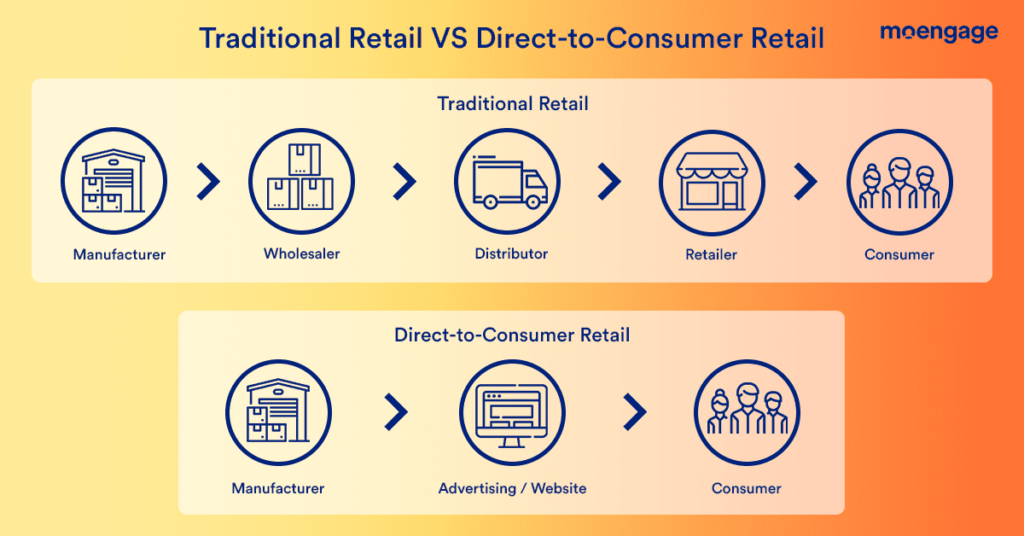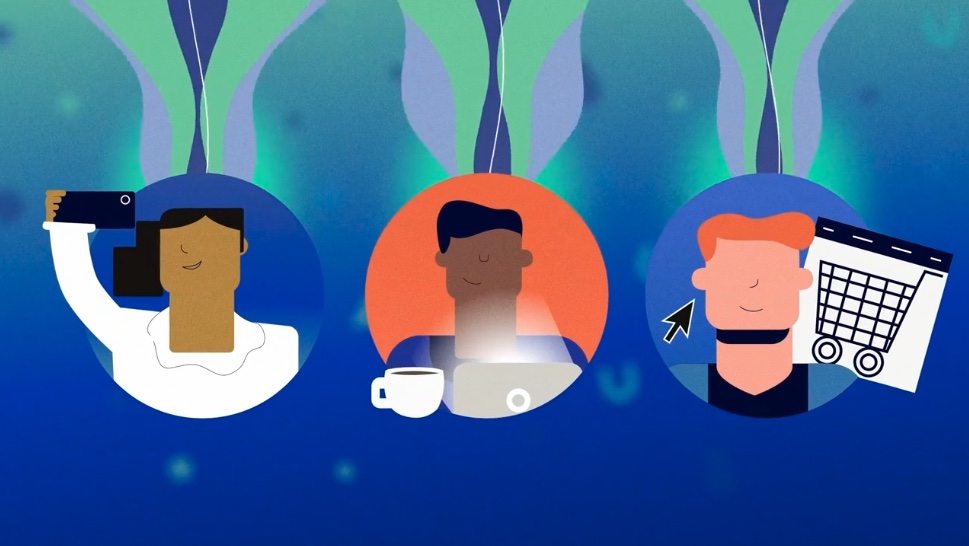There’s lots of important channels out there. The English. ESPN. Back. But in the world of digital video production, none are more important than marketing channels.
A marketing channel refers to the intermediaries or the path through which goods or services move from a producer to a consumer. It represents the overall supply chain of businesses and the intermediaries involved in completing a customer order and ensuring it reaches the hands of the customer.
Effectively utilizing marketing channels can help companies make their offerings more accessible to their target market and bridge the gap between the producer and consumer.
Some of the challenges that could appear in a marketing channel include logistics, geographical distance, and fragmentation in the market.
Types of Marketing Channels
Multiple types of marketing channels exist depending on the number of intermediaries involved:
Direct-to-Consumer (D2C)
D2C is the sale of products straight to the consumer without the involvement of any retailer or wholesaler. Some examples include door-to-door sales, physical stores, and even through the company websites or social media handles. D2C allows companies to retain full control of the overall pricing and customer experience and eliminates any intermediate costs.

One-Level Channel
As the term suggests, a One-level channel involves a single intermediary, the retailer. Goods or services are sold to the retailer, which, in turn, is sold to the end customer. A clothing brand selling through a departmental store is a good example of this type.
Another example could be a consumer electronics company working through big-box retailers. One-level channels are popular among branded items that require a physical store or presence.
Two-Level Channel
A two-level channel involves two intermediaries - a retailer and a wholesaler. The manufacturer sells to the wholesaler, who then sells to a retailer, finally making its way to the customer. This is common among packaged goods, where wholesalers can work with multiple retailers.
Two-level channels help businesses expand their reach and deal with multiple retail channels while minimizing vendor relationships with few wholesalers.
Three-Level Channel
Three-level channels add another layer to the marketing channel - the distributor or agent.
Here, agents purchase the product from the seller channeling it to the wholesalers who distribute it to the retailers, ultimately finding its way into the hands of the buyer.
Three-level channels are common among products that need special handling or a deeper distribution network. These include large industrial equipment makers and consumables that need specialized handling expertise.
The key difference between D2C and other channels is customer loyalty. Brands with a loyal audience would benefit from setting up a D2C channel to improve profit margins.
However, if your product does not enjoy high loyalty, switching to an intermediary model could help reach new audiences that may not have purchased from you.
It is also worth noting that regardless of the number of levels in your marketing channel, the onus of providing customer support and ensuring satisfaction among the end customers falls on the seller, not on the channels they are distributing the product.
The three-level channel represents one of the more intricate paths a product can take to reach consumers. However, simply having a defined marketing channel is not enough - companies must also focus on channel marketing, which is distinctly different from just the channel itself.
Marketing Channel vs Channel Marketing
While marketing channels represent the path products take to reach consumers, it can often be confused with channel marketing, a strategy businesses deploy to promote, sell, and distribute their offerings through these channels effectively.
Channel marketing involves managing relationships with channel partners, providing them with resources and support, implementing marketing campaigns tailored to specific channels, and aligning sales and marketing efforts across various touch points.
It encompasses activities such as training channel partners, developing co-marketing campaigns, offering incentives and rewards programs, providing marketing collateral and sales tools, and monitoring channel performance.
In some ways, simply establishing a relationship with a new channel can be considered ‘channel marketing’. A good example of this would be Peppa Pig, the popular British children’s show collaborating with toy store Hamley’s to sell their merchandise to consumers.
However, the term itself has become popular in the past couple of decades after the emergence of the Internet as a medium of commerce. This has introduced several new internet-based channels that are effective for marketing.
E-commerce marketplaces
E-commerce marketplaces like Etsy, eBay, and Amazon are lucrative channels to market your products. They make it easier for businesses to reach out to global audiences and collect necessary consumer data to improve their targeted marketing efforts in the future.
Social media
Popular media platforms like Instagram, Facebook, TikTok, and Twitter allow businesses to sell and market products to users directly. Modern-day AI tools help them automate customer interaction and lead nurturing processes, which helps build brand reputation.
In addition to social media marketing, influencer marketing is another layer of channel marketing that leverages the personal brands of various personalities to reach their audiences.
Affiliate marketing
Affiliates are partners who use distribution channels like email, social media channels, and paid ads to promote and sell products in return for a commission on the sales. Affiliates help businesses expand their reach, and reduce the cost of customer acquisition, in return for sharing profits with a trusted partner.
Email marketing
Businesses can also reach customers through newsletters, email campaigns, and other promotional offers. Email marketing allows for personalized communication, targeted promos, and lead nurturing.
A big advantage of email marketing over other internet marketing channels like social media or e-commerce marketplaces is that it lets businesses retain control over their audiences and not be impacted by changes to third-party algorithms that can affect the ranking and visibility on these platforms.
Importance of Marketing Channels
An effective marketing channel is crucial for businesses to reach their target customers and drive sales.
They bridge the gap between producers and consumers, enabling companies to overcome barriers such as geographic distance, logistics challenges, and market fragmentation. Marketing channels also provide a structured framework for distributing products and services, allowing businesses to expand their market coverage and tap into new customer segments.
Leveraging the right marketing channels can significantly increase cost-effectiveness by leveraging economies of scale and sharing resources among channel partners.
Additionally, channel intermediaries possess specialized expertise in transportation, storage, sales, and customer service, enabling businesses to focus on their core competencies while relying on partners for efficient operations.
Moreover, marketing channels facilitate the flow of valuable market information, providing insights into customer preferences, competitor activities, and emerging trends. This intelligence can inform product development, marketing strategies, and decision-making processes, ultimately driving business growth and competitiveness.
Overall, well-designed marketing channels are indispensable for companies to effectively distribute their offerings, reach their intended markets, optimize operations, and achieve their sales and marketing objectives in an increasingly competitive business landscape.
Given the numerous benefits that well-designed marketing channels offer businesses, from increased market reach to cost-effectiveness and valuable market insights, developing a comprehensive strategy is imperative to maximize the potential of these channels.
Marketing Channel Strategy: The 6Cs
Creating an efficient marketing channel plan is critical for businesses to leverage the potential of their channels and accomplish their business objectives. A thorough channel strategy must leverage these partners to maximize performance and customer happiness.
One well-known structure is the "6Cs" of marketing channel strategy. To develop an effective marketing channel strategy, companies should consider the following 6Cs:
1. Coverage
Ensuring products are available and accessible to target customers through appropriate channels that align with their buying preferences and behaviors.
2. Control
Maintaining control over product quality, pricing, and promotion across channels to ensure consistent brand experience and messaging.
3. Cost
Minimizing channel costs while maximizing profitability and customer satisfaction by optimizing logistics, inventory management, and channel relationships.
4. Consistency
Ensuring a consistent brand experience and messaging across all channels to build trust and reinforce brand identity.
5. Coordination
Aligning and coordinating channel partners' efforts, including marketing campaigns, inventory management, and customer service, for seamless operations and a unified customer experience.
6. Conflict Management
Addressing and resolving potential conflicts among channel members, such as channel pricing strategies, territory disputes, or competition among resellers, to maintain healthy channel relationships.
Understanding the 6Cs of marketing channel strategy is a great way to develop an effective plan that aligns with your target market, business objectives, and operational capabilities.
Videos In Marketing Channels
Seamless communication is a quintessential need for the smooth operation of any marketing channel, regardless of the number of levels in them. Videos play a crucial role in ensuring this.
In a D2C channel, where the business interacts directly with the consumer, videos play a crucial role in marketing and communicating the value proposition to the end buyer. A good example of this would be the launch campaign of The Dollar Shave Club that amassed thousands of customers overnight through their D2C channel mainly with the use of one video campaign.
For higher-level marketing channels, videos are primarily used as a source of training and onboarding customers. This could be as explainer videos, educational videos, as well as videos for marketing that includes testimonial videos, and commercial ads.
Wrapping up
Smartly optimized and designed marketing channels are crucial for companies to reach target audiences and distribute their offerings properly. When done in the right manner, these channels can play a role in helping them achieve their marketing and sales objectives.
Businesses that properly pick and manage their marketing channels may gain a competitive edge, improve their operations, and drive growth in an increasingly competitive industry.
